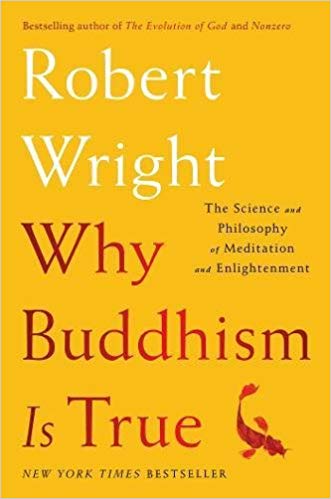Robert Wright – Why Buddhism is True Audiobook Free
Robert Wright -Why Buddhism is True Audiobook

Why Buddhism is True Audiobook
As Wright sees it, ‘The Reality’ of the human problem is to be uncovered in all-natural choice, as explained via transformative psychology in his really early book The Ethical Pet: Why We Are, the Means We Are: The New Scientific Research of Evolutionary Psychology. And also he recommends that this truth is distinctly attended to by ‘The Way’ of Buddhism, or at least naturalisticBuddhism This ‘nonreligious Buddhism’ is Buddhism without reincarnation, spirits or gods. Why Buddhism is True Audiobook Free. Likewise the concept of complete or durable knowledge is held at arms dimension.
Nonreligious, naturalistic Buddhism hinges on a couple of important ideas: the concept that people do not have a vital ‘self’ (no- self), the principle that displeasure (dukkha) is brought on by the ‘hedonic treadmill’ of search of satisfaction as well as likewise evasion of pain, which representation can aid us to leave this treadmill. The thoughtful strategy is comparable to that of Stephen Batchelor in Admission of a Buddhist Atheist in addition to Nonreligious Buddhism: Thinking Of the Dharma in an Uncertain Globe.
There is a clearly Gnostic curved to the making up right below, right from the get go, when the movie The Matrix is explained. Right below all-natural choice is the procedure which holds us in a state of deceptiveness, contorts our understandings of truth, prevents us from experiencing durable complete satisfaction as well as likewise complete satisfaction, as well as likewise maintains us caught on the hedonic treadmill. And also nonreligious-Buddhism is The Way (the ‘red tablet’) that will certainly free us from this unrestricted drama of deception as well as dissatisfaction. This view of development stands in considerable comparison maintaining that of Wright’s previous magazine, The Improvement of God (Back Bay Visitors’ Select), in which natural in addition to social development are instead ‘divine’ procedures where the Superb becomes reveal on the planet. (The God- as- Advancement view is in addition that of the ‘Essential’ spirituality of Ken Wilber, Steve McIntosh, as well as likewise others.).
Component of this book is committed to disclosing that the essential concepts of nonreligious-Buddhism are clinically true, via discussion of investigates in psychology as well as neuroscience (a method revealed to Standing up: A Summary to Spirituality Without Religious Beliefs, by Sam Harris). This would definitely be additional encouraging if the investigates were explained as a method of reviewing Buddhism versus completing ideas of health and wellness, such as modern-day favorable psychology, yet the book usually stops this sort of straight comparison. This is reflective of the essential technique of nonreligious-Buddhism: the ideas which do not uncover support in scientific researches, such as reincarnation, or lasting knowledge, are deserted or lessened. Nonreligious-Buddhism is reformulating Buddhism to be a lot more normal with modern-day psychology, a vibrant which makes complex the concern of whether clinical research study can be used to reveal that ‘Buddhism applies’.
Wright raises on the concept of ‘no- self’ by supplying a ‘modular’ layout of the mind. The principle is that our mind is made up of parts with various purposes, requirements, in addition to assumed patterns. The parts rush as well as tackle each various other on the subconscious degree. Simply when amongst them brings an adequately solid sensation, do we after that familiarize its affiliated concept on a mindful degree. While Wright finds some support for this modular design from the Understanding Reflection university, as well as likewise from psychological research study, he develops it through his very own advised point of view of transformative psychology (Darwinian rivals within the subconscious mind). Remarkably, the variation is got to recommend just how mindfulness can improve our ‘self’- control, in addition to to compromise the pull of indulgent or addictive practices.
Among the satisfaction of The Improvement of God was its in- deepness historic circumstances of the techniques which the ‘spiritual market’ of completing ideas, as well as likewise the requirements of vendors, kings, as well as likewise leaders all impacted the development of old Judaism, Christianity, in addition to Islam. Wright may have likewise taken this technique with Buddhism, discovering just how its background as the state religious beliefs of numerous worlds has really developed its development in time in addition to location. I was anticipating this, as well as am disappointed not to uncover it below. Nonetheless, Wright rather deals with to manage some instead refined thoughtful problems, such as the difference in between the Buddhist concept of ’em ptiness’ (sunyata) as well as Hindu non- dualism, in such a way that is uncommonly offered. He liven up the conversation with narrative accounts of previous conversations as well as conferences.
This magazine stays in a number of indicates an individual account: Wright has actually found a variation of nonreligious-Buddhism that is True for him in his life, as well as he is bringing us along via his experience as well as presumed treatment. Unlike great deals of authors on Eastern spirituality, he is in no other way trying to existing himself as informed, or a spiritual educator or master. He is refreshingly plain– humorously self- wiping out, as well as likewise clear concerning his inspirations for making up. Robert Wright – Why Buddhism is True Audio Book Download. Along with he is a clear author– he does not attempt to discourage us with obtuseness as well as enigma, likewise when resolving hard ideas. The book is not regularly persuading, nonetheless it is entailing, pleasant, as well as idea- prompting.